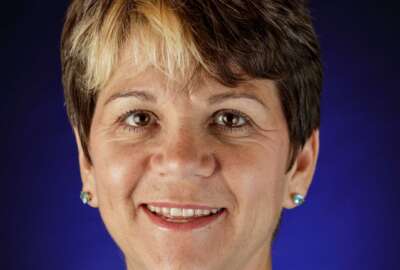

Karen Evans, former chief information officer at the Department of Homeland Security, joins Aileen Black on this week's Leaders and Legends to share important...
Karen Evans, former chief information officer at the Department of Homeland Security, joined Aileen Black on this week’s Leaders and Legends to share important leadership lessons and advice on how to build strong teams.
Evans has more than 30 years of executive-level management experience focusing on cybersecurity, national security, technology innovation and supply chain risk management. She served in three Presidential appointed positions in two administrations.
Evans described her leadership style as demanding but added that her employees always knew where they stood with her.
“I think I’m pretty clear about the results that I want the team to achieve. I hope and what I expect is, that the communications are open so that I can get them the resources they need to be able to achieve those results,” she said.
Evans went on to say that she often relied on feedback from her employees when making big decisions. It was a lesson she learned from a branch chief she worked for earlier in her career when her boss pulled her aside to say that they saw something in Evans.
“She saw the potential that I had. And I thought to myself, if she thought that much of me to take me aside and talk to me about what I needed to improve in myself, you know, I should really take the time to go back and honor that, and really look to see what types of things I need to improve on,” Evans said.
After that conversation she enrolled in some management training courses offered within the federal government, some of which she actually ended up teaching later on in her career.
During her tenure as DHS CIO, Evans said she realized how important it is to find talented technology professionals and convince them work in the federal government. Recruiting that talent is one of the biggest challenges facing federal agencies today, she said, adding that “It’s all about the people. I always said a fool with a tool is still a fool, right? So it’s not about the tools. It’s about the people and the education of the people.”
Evans suggested viewing this as a continuum, such as skill sets between one and 10: “Not everybody needs to be a 10. It’s like medical school, you know, like, we need brain surgeons, but not all doctors become brain surgeons, not all lab technicians [become] brain surgeons, right? They become the best lab technician that they can.”
She said we all have a certain amount of cyber savvy because we use technology every day., but there is a need for cyber acumen and it’s time for Congress to allocate the resources to get everyone educated up to a certain level.
Finally, she had some advice for the members of the next generation who want to follow in her footsteps, saying it’s important to know your strengths and weaknesses and to base any career decisions on your core values.
While it’s hard to be reflective and look inward, if you do so, “It’s easier to make the decisions that you need to make going forward for your career. It’s easier to build the teams, because you know, your own weaknesses, so that you can hire people that complement your weakness so that you’re really a strong team going forward,” Evans said. “But if you, hire everybody who looks like you, then you’re going to have blind spots. And when I say look like you I’m not talking about all women, or who are Japanese-American, like myself. I am talking about folks with different strengths and perspectives.”
Copyright © 2025 Federal News Network. All rights reserved. This website is not intended for users located within the European Economic Area.

